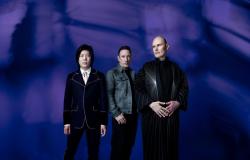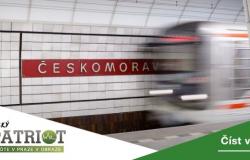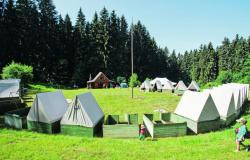Student Jan Boháč has written a petition for the removal of communist decorations from the Anděl subway, and when he collects enough signatures, he wants to present the whole matter to the Prague municipality. Boháč is particularly bothered by the Prague–Moscow inscription several meters high and the plaque proclaiming the bond of friendship between the Czech Republic and the Russian Federation.
“We, the undersigned, do not want communist elements or elements openly supporting the Soviet Union to be in the Anděl metro station in Prague,” writes a student in a petition with thatthat the decoration is inappropriate even with regard to the Russian invasion of Ukraine.
survey
Are you happy that the aid package for Ukraine passed in the US?
voted: 14707 people
“We think that such a link here now, in the time of the Russian aggression in Ukraine, definitely should not be. According to U.S this may, for example for tourists or refugees from Ukraine, endanger the clearly defined foreign policy of the Czech Republic, to the extent that, for example, foreigners may not be sure whether they are in a pro-Western country or a Russian enclave,” claims Boháč and suggests , so that the city will deal with the decoration in the same way as with the statue of Marshal Koněv, which was removed in 2020 and handed over to the museum.
According to him, it bothers Boháč when he has to look at communist decorations every day on his way to school. “It’s bothered me for a long time, I feel ashamed every time I walk by, so I decided to do something about it. First I looked to see if such a petition already existed, but I couldn’t find one, so I started my own,” he said Boháč for Pražský Deník.
He is said to be most bothered by the inscription: Stanice Moskevská, built in 1985 jointly by Prague and Moscow metro builders in honor of Czechoslovak-Soviet friendship. “In my opinion, the inscription directly and openly points to a friendship that actually never existed, but it definitely does not exist today,” the student expressed his opinion.
Jakub Kuneš, lawyer and economist, also joined his opinion. “If you were interested in how Moscow imagines the friendship that we so proudly promote in Prague at Anděl,” commented Kuneš on the social network. Kuneš in the past gave an interview to Seznam Zprávám – at the time when Miroslav Ševčík was elected as the new dean. He talked about how the faculty is gripped by fear and Ševčík presents disinformation to the students. Whether it’s about covid or the war in Ukraine.
Photo: Jakub Kuneš, social network X
The spokesman of the Prague municipality, Vít Hofman, mentioned about the whole matter that the councilors are not considering the removal of these sculptures, because it is part of the history of the metro in Prague. “This is a historical part of the space, i.e. also part of the architecture and art of the station, and the Transport Company did not go the way of cancel culture,” said Hofman.
“It seems to me the same as if there were inscriptions ‘Prague-Berlin’ or ‘Arbeit macht frei’ next to the buildings built under the Protectorate of Bohemia and Moravia. I think we should think about whether we want such signs here. And if not, then why should we have inscriptions here expressing something similar, only from a different time?’ student Boháč compared in a statement for iDNES.cz.
“It’s clearly a pro-communist sign. As part of history, it can be moved to a museum, for example, but nowadays it certainly does not belong in public space. It can also be very unpleasant for the Ukrainians who live here now,” he specified, and that the city should deal with the decoration in the same way as with the statue of Konev or Stalin.
This year, the Prague Metro celebrates 50 years since the opening of the first section of route C in 1974. The grand opening was then scheduled for May 9 as a commemoration of the liberation of Prague by the Red Army and the end of World War II. It was then a great manifestation of good relations and mutual cooperation with the Soviet Union. Many stations of the emerging subway bore ideological names or the names of communist figures.
The sculpture in the Anděl subway was created in the 1980s and symbolized the cooperation of engineers from the Soviet Union and Czechoslovakia. The station was originally called Moskevská and was worked on by a Soviet team; the Czech team in return built Moscow’s Pražskaja station, which has kept its name to this day.
After the revolution in 1990, Prague renamed all stations with communist connotations. So, for example, Leninova station changed to Dejvicka, Gottwaldova to Vyšehrad, Budovatelů station to today’s Chodov. In the same way, the Druzhba station was renamed to Opatov and Kosmonautů to Háje.
Add PL to your favorite feeds on Google News. Thank you
Did you like this article?
You can support the independence of our editorial office with a monetary donation of any amount by bank transfer to the following account:
131-981500247/0100
The QR code contains payment information, determine the amount yourself.

Are you a politician? Post whatever you want without editing. Register HERE.
Are you a reader and want to communicate with your representatives? Register HERE.
author: Vanda Efnerová
FactChecking BETA
A factual error in reporting? Help us fix it.
Examine
Tags: imagine friendship Moscow hung sign graves Ukraine metro station
-







